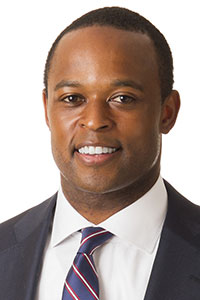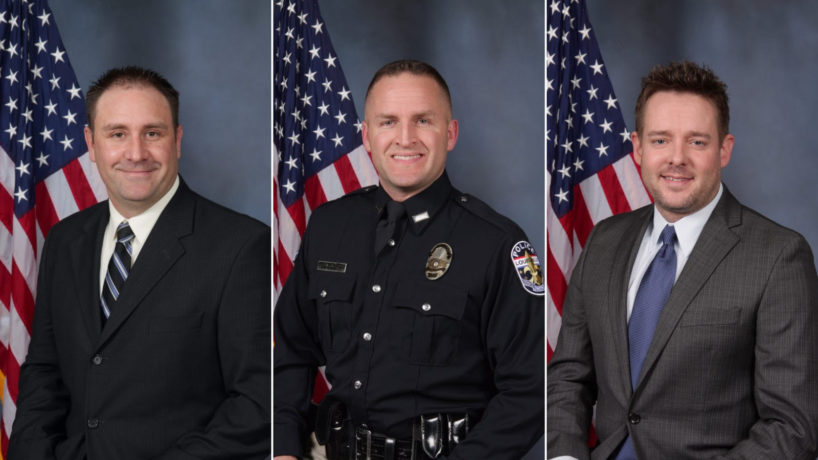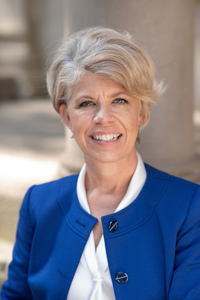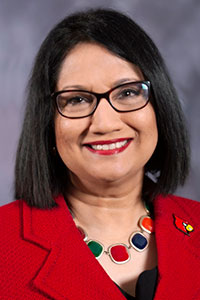
FRANKFORT, Ky. — Attorney General Daniel Cameron announced Wednesday the completion of the Special Prosecution Unit’s (SPU) investigation into the death of Breonna Taylor. The findings of the investigation were presented to a Jefferson County grand jury, and the grand jury indicted former Louisville Metro Police Department (LMPD) Det. Brett Hankison with three counts of wanton endangerment, a class D felony.
“The loss of Ms. Breonna Taylor’s life is a tragedy, and our office has worked tirelessly since receiving the case in mid-May to review all of the evidence in preparation for presenting it to an independent grand jury,” said Cameron. “The grand jury determined that there is no evidence to support a criminal violation of state law caused Ms. Taylor’s death. The grand jury found that there was sufficient evidence to indict Detective Hankison for wanton endangerment for firing his weapon outside a sliding glass door and through a bedroom window, with some bullets traveling through that apartment and entering the apartment next door while three residents were at home.”
During the course of the independent investigation into Taylor’s death, SPU conducted interviews, sought the expertise of state and federal partners, including the KSP and FBI crime labs, and spent thousands of hours examining all of the available evidence. SPU completed the last interview in the case on Friday, Sept. 18, and began presenting the findings to a Jefferson County grand jury on Monday, Sept. 21.

In the early morning hours of March 13, Sgt. Jonathan Mattingly, Det. Brett Hankison, and Det. Myles Cosgrove executed a search warrant at the home of Breonna Taylor. The officers were advised by superiors to knock and announce their presence in serving this specific search warrant.
Evidence from SPU’s investigation shows that officers both knocked and announced their presence at the apartment. The officer’s statements about their announcement are corroborated by an independent witness who was near in proximity to Taylor’s apartment.
When officers were unable to get anyone to answer or open the door to the apartment, the decision was made to breach the door. After breaching the door, Mattingly was the first, and only officer, to enter the residence. Mattingly identified two individuals standing beside one another at the end of the hall, a male and female. In his statement, he says that the male was holding a gun, arms extended, in a shooting stance. Mattingly saw the man’s gun fire, heard a “boom,” and immediately knew he was shot as a result of feeling heat in his upper thigh.
Kenneth Walker fired the shot that hit Mattingly, and there is no evidence to support that Mattingly was hit by friendly fire from the other officers. Walker admitted that he fired one shot and was the first to shoot. In addition to all the testimony, the ballistics report shows that the round that struck Mattingly was fired from a nine-millimeter handgun. The LMPD officers fired 40 caliber handguns.
Mattingly returned fire down the hallway. Mattingly fired six shots. Almost simultaneously, Cosgrove, also in the doorway area, shot sixteen times. This all took place in a matter of seconds.
In total, six bullets struck Taylor. Medical evidence in the case shows that only one shot was fatal. Further medical evidence shows that Taylor would have died from the fatal shot within seconds to two minutes after being struck.
Hankison fired his weapon 10 times—including from outside a sliding glass door and through a bedroom window. Some bullets traveled through apartment four and into apartment three, before some exited that apartment. At the time, three residents of apartment three were at home, including a male, a pregnant female and a child.
There is no conclusive evidence that any bullets fired from Hankison’s weapon struck Taylor.
The KSP ballistics analysis did not identify which of the three officers fired the fatal shot. The FBI Crime Lab was asked to conduct an analysis to see if their analysis reached the same results. The FBI ballistics analysis concluded that the fatal shot was fired by Cosgrove.
SPU looked at both reports to determine if there were major differences in the procedures used by each lab that would have led the FBI to identify who fired the fatal shot. Both law enforcement agencies used similar equipment and analysis, but issued different findings.
The investigation found that Mattingly and Cosgrove were justified in their use of force, after having been fired upon by Kenneth Walker. Secondary to this justification, the KSP and FBI ballistics analysis reached different conclusions, creating a reasonable doubt in the evidence about who fired the fatal shot.
Also at Wednesday’s announcement, Cameron announced he will be creating a task force to review the process for securing, reviewing, and executing search warrants in Kentucky. The task force will include elected leaders, citizens, law enforcement representatives, members of the judiciary, defense attorneys and others.
“Conducting a top to bottom review of the search warrant process is necessary to allow input on the current system and determine if changes are required,” said Cameron. “This is a necessary step for our law enforcement, citizens, and elected leaders to take together, and I look forward to leading this important discussion.”
Statements from state leaders

“On learning of the legal decision on Breonna Taylor’s killing, the Prichard Committee for Academic Excellence is committed to speaking for justice and community, beginning with recognition that our commonwealth has failed to build structures where Black citizens can fully flourish.
“It is vividly clear to us today that Kentucky law enforcement practice and our rules for the safety of humans in their homes and our streets must change. The work of anti-racism – of creating a society that works for all of us — must permeate all institutions and our lives together.
The Prichard Committee’s work is in education, and we therefore commit to intensive, sustained, collaborative work in that field. We will say more on that in a few hours. For now, we offer our solidarity to all who are angry, grieving, and frightened by Ms. Taylor’s death, and our determination to contribute to a Kentucky that respects, empowers, and protects Black lives.
— Brigitte Blom Ramsey, president & CEO of the Prichard Committee for Academic Excellence

“Moments ago, a Louisville grand jury indicted one of the three officers involved in the killing of Breonna Taylor on March 13th, but not on charges related to her killing. While I am pleased that the grand jury has acknowledged the unlawful actions of this police officer and that he will be tried for the unnecessary violence he caused that night, I am disappointed that our justice system allows these atrocities to occur all too often with relatively little consequence.
“Today’s announcement of charges does not change the fact that Breonna Taylor was killed in her home, another Black woman who lost her life at the hands of law enforcement. It does not fix a system that allowed that to happen. A new study by Harvard researchers finds that Black people are three times more likely on average than white people to be killed during a police interaction.
“If you need help processing this news, please reach out to one of the many resources available to you as a member of our UofL community. The Counseling Center will offer virtual and personal counseling sessions for students. The Employee Assistance Program will provide counseling services for faculty and staff.
“Today’s announcement is a reminder that we must recommit to pursuing racial justice and pushing for changes in law enforcement, our legal system, public policy and our educational curricula.
“Change will not come easy. We acknowledge that the path of progress has seldom run smoothly and we are more determined than ever to seek racial equity and justice.
“As the late civil rights icon and U.S. Congressman John Lewis said:
‘Ours is not the struggle of one day, one week, or one year. Ours is not the struggle of one judicial appointment or presidential term. Ours is the struggle of a lifetime, or maybe even many lifetimes, and each one of us in every generation must do our part.’
“As I said in an earlier email, let us do our best to demonstrate to one another during this historic and difficult time that we are truly a community of care that values diversity and inclusion and respects our people, irrespective of their positions. I commit again to you today that I will do my part in the ongoing fight to ensure social justice, equal opportunity for all and the elimination of all forms of racism. I hope you will join me.”

“We are our history.
“The reckoning we now confront as a country cannot be for one moment or one semester. We must, necessarily, carry it with us always – as both burden and reminder, as collective grief and motivation.
“One of those heartbreaking reminders of our ever-present history is our former student, Breonna Taylor. Her death – and the aftermath of it – is a tragedy. Unfortunately, tragedy does not capture the sense of loss and anger, weariness and cynicism so many of us feel right now.
“Many of us, I know, are left with the feeling that no matter how much we try, we cannot possibly understand what our neighbors and friends of color are experiencing – each day – even as we now have seen the images repeatedly flashed on screens large and small.
“I can try to picture what it means when colleagues tell me they are consumed with fear when their children leave home to run an errand. I can try to grasp the worry friends say they feel when a loved one departs for a simple jog.
“However, I cannot really ever understand. Yet, I can listen. I can care. And I can act.
“How Breonna’s tragic death is addressed as a matter of law is not something I, or anyone on our campus, can control or ordain. What we can control is how we respond as a community. What we can determine is the sense of moral clarity, intellectual focus and urgent commitment we bring to ensuring it never happens again.
“We can provide spaces to gather and grieve, to discuss and dream. Our students are doing that, utilizing our MLK Center as a place to reflect, to share and process this moment. It is a small step, but a necessary one. Sharing ideas, after all, is how we always begin.
“We have made our counseling center available to students, who we know will have questions and harbor pain during this time. You can go here for information on services, or call 859-257-8701, for more instructions.
“And we can also bring to this moment the ability to marshal tremendous intellectual capacity, across an array of disciplines, to understand our history and summon ideas and reforms that might address the systemic, systematic racism that brought us here.
“Our own police department has been part of this process already. The department recently used an outside facilitator for anti-racism training to explore how to best confront the biases we all share. Our department also is exploring still other ways to be part of sustainable solutions for the future. Our senior administrative team and academic leadership also took part in anti-racism training this week as a start to what we know must be long efforts to create change within our campus culture.
“A number of students, staff and faculty are considering how to carry forward the conversations and ideas for policy reforms and programs. Can we reimagine what a new judicial and legal system, founded on anti-racist ideas, looks like? How might we consider reforms that open wider the doors to capital and support entrepreneurship and business creation? Can access to health care and outcomes of that care be more open and equitable?
“Racism is not simply our shared and tortured past. It is our present. Believing otherwise is neither realistic nor honest. And we will carry it with it us, even as we work each day to erase its stain and undo its damage.
“But our blighted baggage does not have to be our future. What seems inevitable today does not have to persist to tomorrow. As an institution, we were founded on the idea that our past – while imperfect and painfully persisting as our present – can include a brighter and more just future.
“We must resist the disheartening temptation to be bound by an unwillingness to imagine. We carry our history with us. We can, though, commit to the idea that history should inform – not limit – our future. In that sense, perhaps, history is giving us a chance to change.
“We may not be able to ever truly understand. But we can listen. We can care. And we must act.”
— Eli Capilouto, University of Kentucky president




















Add Comment